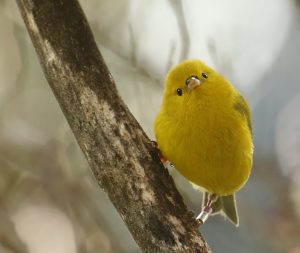Kauai Recovery Project Receives $5K to Save Native Birds
A Swedish organization has pledged $5,000 in grant support to help protect some of Kaua‘iʻs rarest forest birds. Club 300 pledged the money to the Kaua‘i Forest Bird Recovery Project (KFBRP) to help ward off invasive mosquito and plant species in the Alaka‘i Plateau that threaten native bird species.
Non-native plants like ginger create areas of standing water where mosquitos can breed and carry avian malaria—a fatal disease for native birds.
“Avian malaria is a serious threat to forest birds,” said Dr. Cali Crampton, KFBRP project coordinator. “The disease is spread by mosquitos. Our researchers have been finding mosquito larvae in pools created by invasive plants like Himalayan ginger.”
Native birds evolved in the absence of mosquitoes and have few defenses against the illness they carry, Crampton said. Avian malaria can be fatal within as little as 24 hours. “Controlling mosquitos is key to saving our native forest birds from extinction,” Crampton said.
Mosquitos are thought to have arrived in the Hawaiian Islands in 1826, when a ship docked in Lahaina on Maui dumped bilge water containing mosquito larvae into a nearby swamp.
Recent research by KFBRP and its partners suggest that invasive weeds make the mosquito problem worse because they slow streams, creating standing water. Invasive plants also shade the pools, keeping them moist and conducive to hatching mosquito larvae. Weeds also reduces food availability for forest birds, which rely on native plants such as ōhi’a lehua to survive.
“Removing invasive species from this fantastic forest area is a win on so many different fronts and involves many partners,” Crampton said. “We’re delighted to be able to expand our work this year with the help of Club 300 and welcome the international recognition that this grant brings of the importance of Kauaʻi’s native birds.”
Kauaʻi has lost five native bird species in recent decades and those that survive are restricted to the Alakaʻi Plateau, a small plot of pristine forest at high elevation. The remaining birds are also at risk from introduced predators such as rats and feral cats, and habitat destruction.















